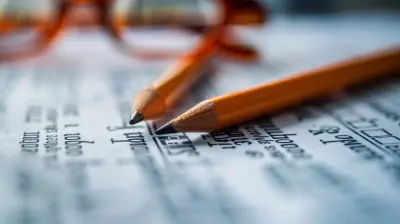23 September 2025
Have you ever sat down to take a test and felt your palms get sweaty, your heart race, and your mind go completely blank? If that sounds familiar, you're not alone. Test anxiety is real, and it can be a massive roadblock to success. But what if I told you there’s a simple, effective way to calm your nerves and boost focus?
Enter mindfulness.
Mindfulness techniques are like a secret weapon for staying cool, calm, and collected during exams. They help you stay present, manage stress, and keep your brain from spiraling into panic mode. In this article, we'll break down exactly how mindfulness can help reduce test anxiety—and how you can start using it today. 
What is Test Anxiety?
Before we dive into mindfulness, let’s talk about test anxiety. If you’ve ever felt overwhelming stress before or during an exam, you know exactly what I mean. It's that sinking feeling in your stomach, the racing thoughts, the fear that you’ll forget everything you've studied.But why does it happen?
Test anxiety is usually caused by a mix of factors:
- Fear of failure – You put so much pressure on yourself to succeed that the thought of failing feels unbearable.
- Lack of preparation – Maybe you crammed last minute, and deep down, you know you’re not as ready as you’d like to be.
- Perfectionism – You hold yourself to impossibly high standards, making even small mistakes feel devastating.
- Previous bad experiences – If you've had a tough time with tests before, your brain might be wired to expect the worst.
Whatever the cause, test anxiety isn’t just annoying—it can actually hurt your performance. That’s where mindfulness comes in. 
How Mindfulness Helps Reduce Test Anxiety
Mindfulness is all about staying present and fully engaged in the moment. Instead of worrying about how much time is left or whether you'll remember that tricky formula, mindfulness keeps you focused on what actually matters—doing your best, right now.Here’s how mindfulness can help with test anxiety:
1. Calms Your Nervous System
When anxiety kicks in, your body goes into fight-or-flight mode. Your heart pounds, your breathing speeds up, and your brain starts to short-circuit. Mindfulness helps counteract this by activating the body’s relaxation response.Simple breathing exercises can slow your heart rate, lower blood pressure, and send a signal to your brain that everything is okay.
2. Improves Focus and Concentration
Ever read a test question five times and still have no idea what it’s asking? Anxiety makes it hard to concentrate.Mindfulness trains your brain to focus on one thing at a time, making it easier to process information and recall what you’ve studied.
3. Reduces Negative Thoughts
One of the worst parts of test anxiety is the nonstop negative chatter in your head:_"I’m going to fail."_
_"I’m not smart enough."_
_"Why can’t I remember this?"_
Mindfulness helps you recognize these thoughts for what they are—just thoughts. Instead of believing them, you can acknowledge them and let them go, shifting your focus back to the task at hand. 
Mindfulness Techniques to Try Before and During a Test
Now that you know why mindfulness works, let’s talk about how to use it. Here are some simple techniques you can start practicing today.1. Deep Breathing
Breathing is one of the most powerful tools for calming anxiety. Try this simple breathing exercise before a test:1. Close your eyes and take a slow, deep breath in through your nose for four seconds.
2. Hold your breath for four seconds.
3. Exhale slowly through your mouth for four seconds.
4. Repeat this cycle five times.
This technique slows your heart rate and keeps your mind from racing.
2. Body Scan Meditation
Feeling tense? A quick body scan can help you relax.- Start at the top of your head and slowly move your focus down to your toes.
- As you move through each body part, notice any tension and consciously relax those muscles.
- This practice helps release physical stress and brings your attention back to the present moment.
3. Grounding Yourself With the 5-4-3-2-1 Method
If you’re feeling overwhelmed right before a test, try this grounding exercise:- 5 – Look around and name five things you see.
- 4 – Touch four things near you (desk, pen, your clothing, etc.).
- 3 – Listen for three different sounds.
- 2 – Identify two things you can smell or recall familiar scents.
- 1 – Say one thing you’re grateful for.
This technique shifts your focus away from anxiety and brings you back to the present.
4. Affirmations and Positive Self-Talk
Your mindset matters. Instead of feeding your anxiety with negative thoughts, try a few positive affirmations:- “I am prepared, and I will do my best.”
- “I am calm, focused, and capable.”
- “I trust myself to remember what I have studied.”
Repeating these affirmations can help rewire your brain to think positively rather than spiraling into self-doubt.
5. Mindful Eating Before a Test
Eating a healthy snack before your exam can help keep your energy levels steady. Instead of rushing through breakfast, take a moment to eat mindfully:- Notice the texture, taste, and smell of your food.
- Chew slowly and appreciate each bite.
- Avoid sugary snacks that could cause a crash mid-exam.
This simple practice keeps you grounded and focused. 
Making Mindfulness a Habit
Mindfulness isn’t just a quick fix for test day—it’s a habit that can help you in all areas of life. The more you practice, the easier it becomes to stay calm under pressure.Here’s how to make mindfulness part of your routine:
- Start small – Even five minutes a day can make a difference.
- Practice daily – Try mindfulness exercises while studying, walking, or even brushing your teeth.
- Use mindfulness apps – Apps like Headspace and Calm offer guided meditations to help you build consistency.
- Be patient with yourself – Like any skill, mindfulness takes time to develop.
Final Thoughts
Test anxiety is frustrating, but it doesn’t have to control your performance. By incorporating mindfulness techniques into your routine, you can train your brain to stay present, focused, and calm under pressure.Next time you feel your nerves creeping in before an exam, take a deep breath, ground yourself, and remind yourself—you’ve got this!









Tatianna Hill
Great insights! Mindfulness truly makes a difference in managing test anxiety effectively.
January 13, 2026 at 12:40 PM